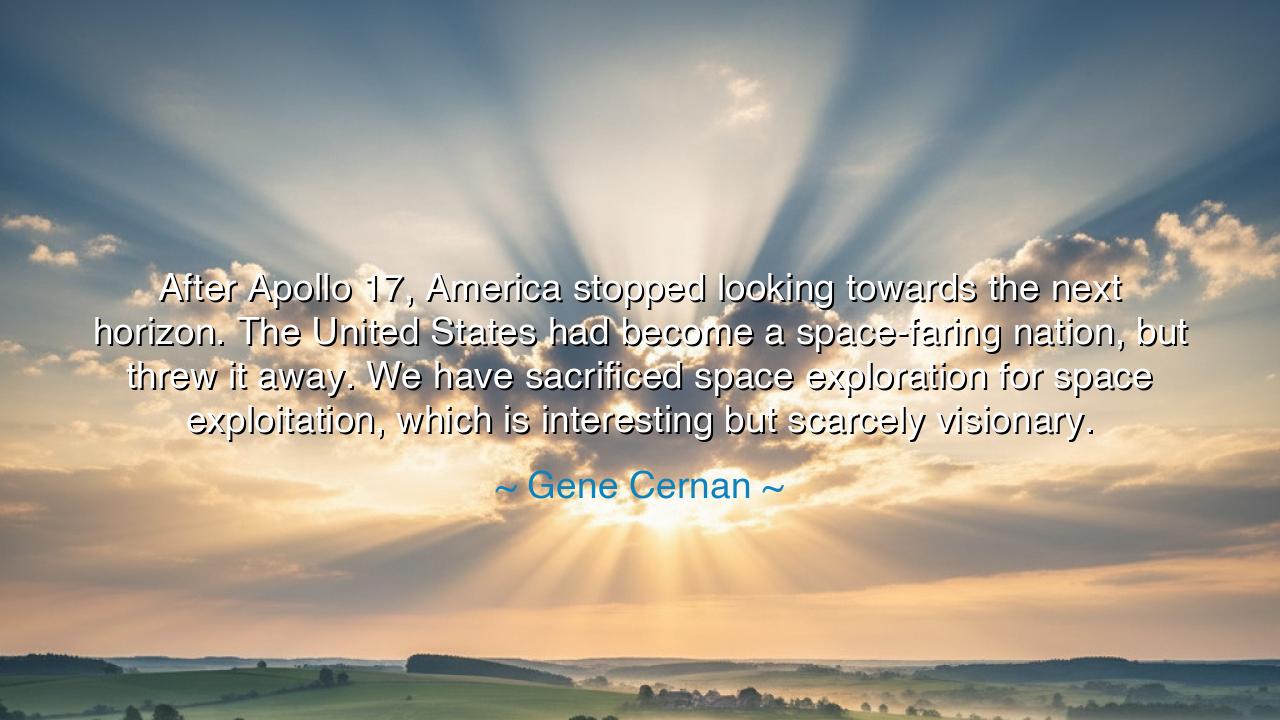
After Apollo 17, America stopped looking towards the next
After Apollo 17, America stopped looking towards the next horizon. The United States had become a space-faring nation, but threw it away. We have sacrificed space exploration for space exploitation, which is interesting but scarcely visionary.






Hear the lament of Gene Cernan, the last man to walk upon the Moon, who gazed upon the silent seas of dust and the rising Earth and later declared: “After Apollo 17, America stopped looking towards the next horizon. The United States had become a space-faring nation, but threw it away. We have sacrificed space exploration for space exploitation, which is interesting but scarcely visionary.” These words ring not as a mere critique of policy, but as the cry of a prophet mourning a squandered destiny. For Cernan knew the difference between the hunger of profit and the fire of vision, and he saw that one had replaced the other.
The Apollo program was more than rockets and missions. It was a testament to what humanity could achieve when it dared to set its eyes upon the impossible. Men stood upon the surface of the Moon not because it was easy, but because the spirit of exploration burned brighter than the fear of failure. It was a time when the phrase “next horizon” was more than poetry—it was a living call to ascend. Yet, as Cernan observed, when Apollo ended with his own footsteps in 1972, the spirit that had reached the stars began to look inward, settling for what was useful rather than what was visionary.
In his words we hear the sorrow of a man who had touched the eternal. He saw the Earth from a quarter million miles away, a fragile blue sphere without borders, and returned to a world that no longer longed for such vistas. Instead of venturing onward to Mars or the outer planets, the energies of a nation were turned toward orbiting satellites, communication networks, and earthly utilities. These things brought wealth and power, yes, but they lacked the grandeur of standing upon a new world and declaring that humankind had grown beyond its cradle. Cernan’s warning was that exploitation without exploration starves the soul of a people.
History bears witness to this contrast. When the great explorers of the Age of Discovery sailed forth—Magellan circling the globe, Columbus reaching unknown lands—they did not seek only trade, but wonder. Yes, merchants would later follow to exploit, but it was the vision of crossing the horizon that inspired the age. Had they remained content with harvesting the riches of their known lands, the world would have stayed smaller, and humanity lessened. Cernan reminds us that when vision falters, greatness is sacrificed upon the altar of convenience.
Yet his lament is also a challenge. For the next horizon still calls. Mars awaits, the moons of Jupiter gleam with possibility, and beyond them lie endless mysteries. Cernan’s words remind us that to live only for exploitation—for profit, for utility—is to live small. To live for exploration—for discovery, for knowledge, for the expansion of human spirit—is to live great. The choice is not only for nations but for individuals: shall we pursue only what is useful, or also what is noble?
The lesson is clear: do not trade vision for utility, nor the fire of wonder for the comfort of profit. Let exploitation serve exploration, not replace it. In your own life, do not settle only for what is safe or beneficial—reach for what expands your spirit. Seek the mountain not only for its resources, but for the view from its summit. Seek knowledge not only for gain, but for the transformation it brings.
Therefore, O seekers, take Cernan’s words into your heart: look to the next horizon. Do not be content with what you already know, nor with the treasures already in your hand. Dare to imagine more. Dare to push beyond what is merely practical, into what is truly possible. For humanity was not made to live only by exploitation, but by exploration—by the endless hunger for what lies beyond. This is the path of greatness, and this is the legacy we must reclaim.






AAdministratorAdministrator
Welcome, honored guests. Please leave a comment, we will respond soon